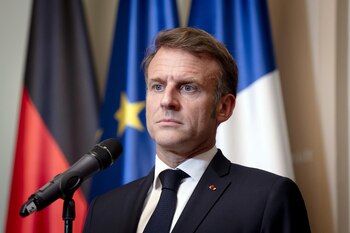
Jordan Bardella, president of the far-right party National Rally (RN), indicated that the only ways to resolve the current political instability in France are the calling of early legislative elections or the resignation of President Emmanuel Macron , according to an interview with the TF1 network.
"There is no single possibility to break the current political impasse: return to the polls (for the National Assembly) and give the French people their say, or for (Macron) to resign and call a new election for the head of state," said Bardella, considered the political successor to Marine Le Pen.
The French political situation worsened after Prime Minister François Bayrou announced on Monday that he would submit a vote of confidence to the National Assembly on September 8. The measure seeks to gain parliamentary support for his austerity plan, which includes a budget cut of €44 billion by 2026.
Bayrou's government faces little chance of passing the motion. Opposition parties maintain their promise to vote en bloc against the confidence vote, which would force the prime minister to resign if the chamber rejects his initiative. Bardella emphasized that the RN parliamentary group, the largest in the National Assembly, will vote against the confidence vote Bayrou is seeking."We will vote, without a doubt, against confidence in the government," said the RN leader, a position shared by both left-wing parties and other opposition forces.
In the event of Bayrou's failure, Macron could choose between calling early legislative elections for the second time in just one year—following those in July 2024—or appointing a new prime minister, who would be the third in less than twelve months. Bardella's statement increases the pressure on an executive that, at present, lacks the necessary majority to push through its economic program in the lower house.
Bayrou's decision to file a motion of confidence has sparked a backlash in French financial markets. The CAC40 index fell by almost 2%, after having fallen 1.6% in the previous session. BNP Paribas and Société Générale both posted losses of more than 6%. Ten-year French bond yields briefly reached 3.53%, their highest level since March, before stabilising at 3.5%.
Several opposition parties have announced their rejection of Bayrou and his austerity policies. Boris Vallaud, the leader of the Socialists, posted on social media:"We need another prime minister and, above all, another policy." Bruno Retailleau, the conservative leader of the Republicans, described voting for the fall of the government as"irresponsible" and "contrary to the interests of France." The far-right RN party claims that Bayrou has de facto recognized the end of his government.
The vote on the no-confidence motion will come just two days before planned nationwide protests led by left-wing groups and unions, the organization of which is reminiscent of the widespread Yellow Vest demonstrations of 2018. Those protests were sparked by rising fuel costs and eventually shaped broader opposition to Macron's economic policies.
Government sources cited in the French press reveal that the government is willing to negotiate details of the budget plan, but maintains the need for cuts. A source close to Bayrou indicated that the vote of confidence seeks to forestall an imminent budget censure. If defeated, Macron could immediately appoint a new prime minister or ask Bayrou to head a caretaker government, although the option of early elections also remains.
Justice Minister Gérald Darmanin told France 2 that while the government is pursuing a compromise agreement, it"could not rule out" the possibility of a new parliamentary dissolution. Macron, the only person with the power to call legislative elections, has yet to make a public statement, although in recent speeches he has stated that he is not in favor of new general elections.

